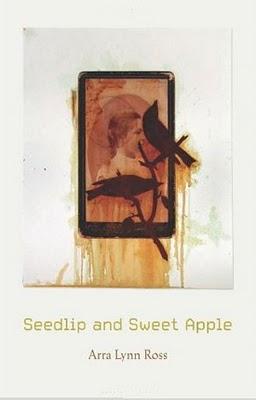Seedlip and Sweet Apple: Poems

Seedlip and Sweet Apple is a poetry collection that blooms with the voice and life of Mother Ann Lee, the founder of the Christian sect deemed the Shakers for their prayerful and "ecstatic" dance. Her followers eschew marriage and reproduction, living in brotherly and sisterly communities devoted to harmony and God. The author, Arra Lynn Ross, has created a cohesive story that will capture you even if you have the barest knowledge of the real life of the religious leader. (For those of you who do want to do some prep work, you can gain reference from the PBS site American Stories, or even Wikipedia.)
In such a slim volume, there is so much depth. Ross plays with form and function, mixing prose with poetry, shaping Revolution-era newspaper articles into stanzas and weaving together bits of Gospels, Shaker writings, William Blake and even Sappho into the Mother Ann's narrative. The notes at the end of the book are a must-read, as they help the reader engage and decode the poetry even further. She also provides a list of her source material, and by the end of the reading, the reader may be tempted to read more on this incredible historical figure.
The poems themselves shine alone (in fact, "Mother Ann Tells Lucy What Gave Her Joy" was featured by the American Academy of Poets as a Poem-A-Day in March, a well-deserved honor). As a collection, the poems form an intense meditation on intimacy. It examines the relationship between lovers, siblings, and a believer and her faith. There are moments of breathtaking intimacy, where the reader feels almost intrusive in the moments of revelation. In "Abraham Left Me on a Thursday," Ross captures at once the joy and loss of the dissolution of Mother Ann's arranged marriage:
"They'll say he was a bad man, but I know how hard it is to live with God. In the flesh, in the flesh, where are you Ann? You're a spirit banging at your own rib cage. [...] he danced me across the room, laughing, the heat from his grip burning my side. I shook my head, No, Abraham, no, and he stumbled. We fell sideways to the floor, tangled, my cheekbone pressed to the wing of his shoulder, the rough weave of his hemp shirt. I could smell sweat soaking the cloth, strong with fear and sadness."
Ross doesn't canonize Mother Ann. Instead, she reveals the human being she was, rife with complex paradoxes: disgust and love, fervor and patience, the dichotomy of the spiritual and corporeal entities. It's a work powerful in voice and craft.
I also want to take a few words to acknowledge the Milkweed Editions, the non-profit publisher of Seedlip and Sweet Apple. I worked briefly in the world of publishing and am compelled to spread their message: "Milkweed Editions publishes with the intention of making a humane impact on society, in the belief that literature is a transformative art uniquely able to convey the essential experiences of the human heart and spirit. In an increasingly consolidated and bottom-line driven publishing world, [the reader's] support allows [Milkweed Editions] to select and publish books on the basis of their literary quality and message." If you care about the value of our national literature, Seedlip and Sweet Apple is well worth the investment.